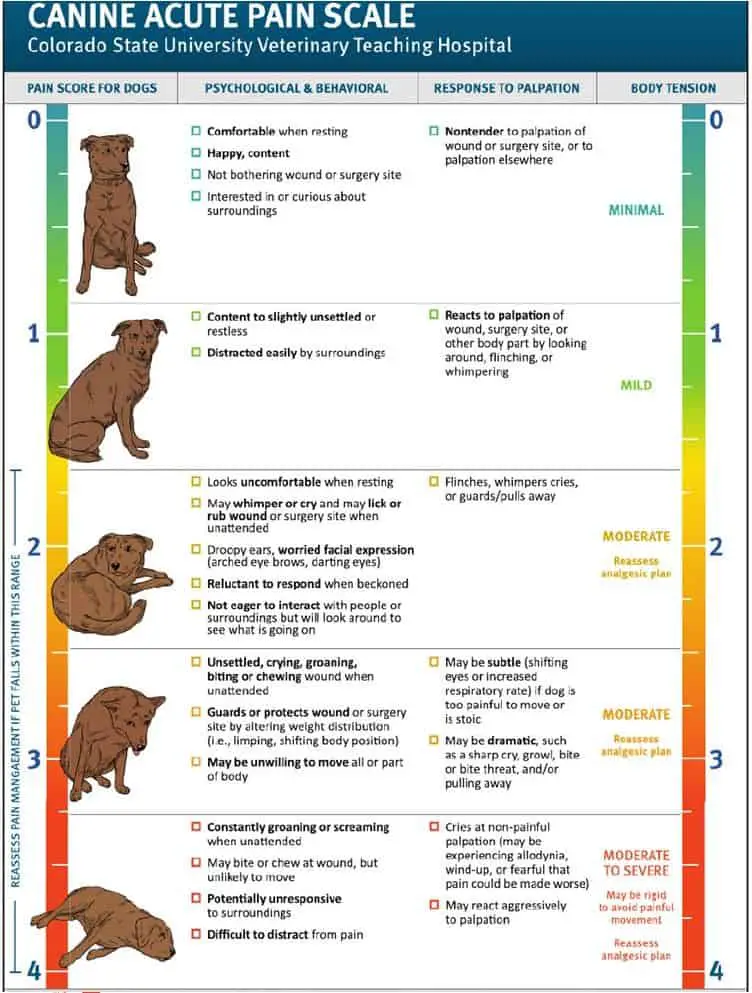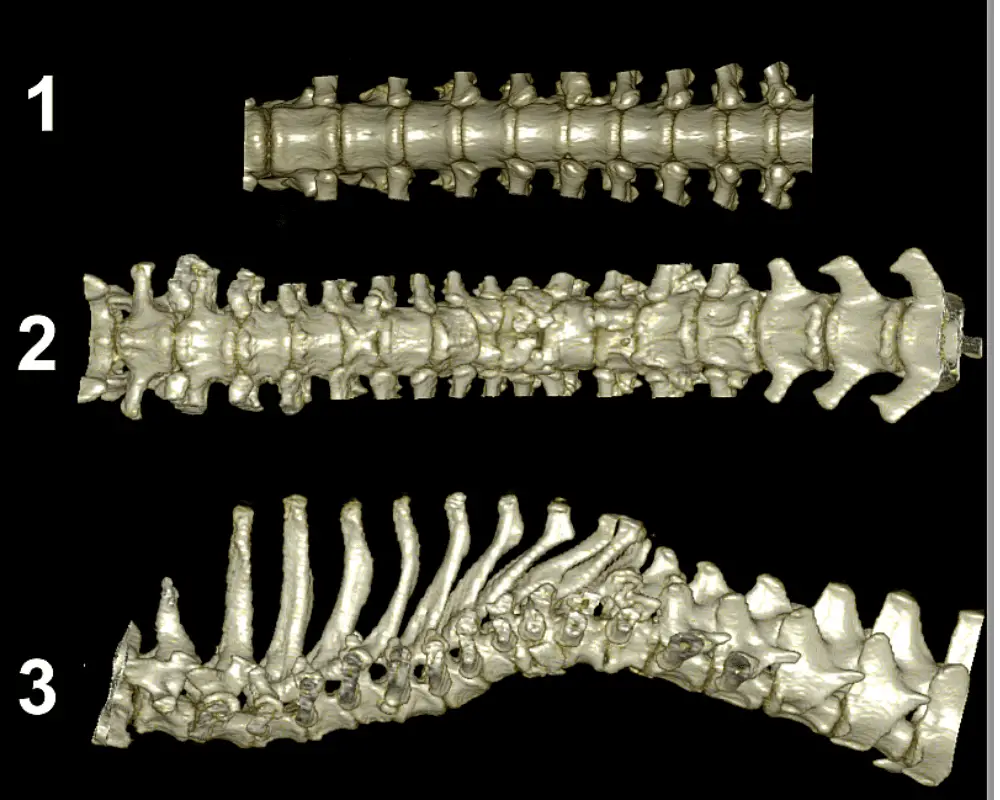
French Bulldogs (also colloquially and endearingly referred to as “Frenchies”) are notorious for their stoic nature and often do not allude to pain when it is present. This may be troublesome as it is not always overtly evident that they are painful, and they may subsequently go for extended periods of time without the necessary care that they may require.
Recognizing that your French Bulldog is in pain may sometimes be a challenge; however, noticing the subtle signs they may display will be incredibly beneficial to them as they can get the necessary tender love and care they require.
A helpful guide to aid in identifying pain in your Frenchie is a pain scale. Many scales are available for use, but they all aim to rank your pet’s pain on a scale of (usually) 0 to 4. This is a great tool to use to monitor the progression of their pain as well as to monitor their response to treatment. Although it may be a subjective measurement, it helps to keep the grading of their pain constant. An example of a pain scale is provided below.

Signs of Pain In French Bulldogs
It is important to note that signs of pain may differ depending on whether the pain is acute or chronic. Symptoms of acute or sudden onset pain are often more noticeable than that of chronic or slow onset pain.
- Reluctance to go up and down the stairs or reluctance to jump onto the couch or bed
- Difficulty moving around or slight stiffness of the neck or limbs
- Poor posture or arched back
- Poor quality coats (chronic pain)
- Sudden, unwarranted aggression
- Change in breathing (usually heavy panting or shallow breathing)
- Constipation
- Inability to get comfortable
- Licking specific areas of their body or excessive grooming
- Worried or tense facial expression
- Reluctance to respond when called and not eager to interact with people or other animals in their vicinity
- Flinching, whimpering, crying, or guarding the painful site
- Lameness
- Hiding away or sleeping for longer periods than normal
- Loss of appetite
- Shivering, shaking, or trembling
Although these may all be indicators of pain, it is valuable to note that some of these signs may not be associated with pain, and the context of the situation should be interpreted concurrently with the presenting symptoms.
For example, shivering may be due to cold weather or ingestion of a toxic substance. If you are unsure of the signs your Frenchie is showing or are having difficulty interpreting them, it is best to contact your veterinarian to get professional advice.
Differentiating Acute and Chronic Pain
Acute pain is often apparent in its presentation, occurs suddenly, and may disappear as quickly as it came about when it is treated or when the inciting cause is removed. Chronic pain (due to little tweaks over time) may be less obvious and go unnoticed, sometimes for months on end.
Chronic pain is often also more challenging to remedy and may persist even after treatment of the injury or disease. This is because the pathophysiology of pain and the type and number of pain receptors involved in a pain response change with chronicity; therefore, it is essential to recognize even the slightest indicators of pain so that you can deal with the pain right from the onset and prevent it from becoming prolonged.
Causes of Pain in French Bulldogs
Pain and discomfort in French Bulldogs can occur for various reasons, including injury or disease. However, these are some common causes of pain in French Bulldogs.
- Intervertebral Disc Disease (IVDD) due to congenital vertebral malformations
- Degenerative myelopathy
- Musculoskeletal disorders (like patellar luxation)
- Hemivertebrae
- Dental disease
- Ear infections (like otitis external)
- Eye disorders (cherry eye, which may predispose to dry eye, glaucoma, and conjunctivitis)
- Trauma (for example, getting hit by a car or being bitten by another dog)
French Bulldogs are particularly susceptible to back problems due to their conformation. Frenchies were bred to have short back legs and curled tails which predisposes them to spinal defects that are often present at birth. This is why diseases like IVDD and degenerative myelopathy are so common in French Bulldogs and rank as one of the highest causes of pain and discomfort in this breed.
Irregular spines may place pressure on the discs between their vertebrae (essentially their shock-absorbing cushions shaped like a jelly doughnut), causing the discs to herniate, become misshapen, or flare up, thereby resulting in pain. In addition, their spinal nerves may become compressed or, as with degenerative myelopathy, start to degrade over time.
In most cases, Frenchies may need surgery to correct these conditions, with physiotherapy and painkillers aiding in the recovery process. However, in severe or untreated cases, French Bulldogs may become permanently paralyzed.

French Bulldogs tend to get worse and progress faster in their disease than other dog breeds and may develop life-threatening complications relatively quickly. Unfortunately, they also tend to develop infections, malformations, spinal tumors, and meningitis, so it is recommended to take proactive care rather than waiting for a problem to arise before trying to rectify it. Proactive care will also be remarkably beneficial in preventing pain and discomfort in your Frenchie.
When Should I Seek Veterinary Care If My Frenchie Is Painful?
A veterinarian is a very valuable resource that can work with and help you to give your French Bulldog a healthy foundation. Often, seeking care as soon as you notice an abnormality will be invaluable in providing a favorable prognosis.
Indications to seek veterinary care include:
- Sudden wateriness or redness of their eyes with noticeable discomfort (like sensitivity to light or rubbing their faces)
- Obvious signs of trauma (open wounds, bleeding)
- Signs of ear infections include pain when their ears are touched, crustiness, odor, discharge, scratching their ears, or excessively shaking their heads
- Sudden inability to walk
- Irregular or absent bowel and bladder function (you may notice that your Frenchie is not or is struggling to urinate or defaecate)
- Hesitance to walk up and down the stairs or jump onto a couch or bed
One of the best things you can do for your Frenchie is schedule regular vet check-ups. This essential preventative care will help your Frenchie live a happy and healthy life. Ideally, yearly vet visits are recommended where routine physical examinations will help indicate early disease signs.
Keeping My French Bulldog Comfortable at Home While Seeking Veterinary Care
There are a few things that you can do to keep your Frenchie comfortable at home while you wait to see the vet. These include helping your Frenchie onto and off the furniture, providing ramps so that they do not need to jump up onto things, orthopedic beds, avoiding rough play, and ensuring easy and free access to food and water, as well as providing regular, gentle grooming.
Some French Bulldogs (specifically those who suffer from degenerative myelopathy or IVDD) may benefit from a wheelchair (K9 Carts manufacture canine wheelchairs).
In the case of chronic pain, obesity may be a significant contributor to long-term pain, and, often, it is one of the things that owners overlook or do not notice. Working with your vet to help your Frenchie lose those extra pounds will help to relieve the extra strain on their joints, improve their breathing and significantly improve their quality of life.
What Can I Give My Frenchie for Pain Relief?
When a beloved pet is in pain, you may be tempted to reach for the nearest painkiller they have and administer it to their pet in the hopes that it will relieve the pain and discomfort their pet is suffering from.
The administration of human drugs to pets by owners may be due to a variety of reasons extending from; “if it worked to ease my pain and discomfort, then it should surely help my dog” to “administering one of my pain killers to my dog is much cheaper than a trip to and consult with a veterinarian” and everything in between.
As tempting as it may be to self-diagnose and self-treat your French Bulldog with human painkillers, it is crucial to remember that your pet is not a human, and their physiology and ability to metabolize drugs differ significantly from your own.
Human painkillers can be toxic and, in severe cases, even fatal to your pet. Common side effects of over-the-counter medications given to pets include, but are not limited to, kidney or liver failure, stomach ulcers, vomiting, diarrhea, bleeding disorders, and even death.
Prostaglandins (specifically the lack thereof) are one of the reasons why human painkillers may be dangerous for use in pets. Prostaglandins are naturally produced by a dog’s body to protect their internal organs. They protect internal organs by preventing blood clotting, increasing blood flow to vital organs (like the kidneys), and help protect the stomach’s inner lining from, for example, gastric ulcers.
Human painkillers often inhibit the formation of prostaglandins. With the inhibition of prostaglandin formation, there is not enough of them circulating in the blood to protect the internal organs, and the protective mechanisms they offer are significantly reduced. When this happens, the
common side effects are seen.
Before administering any form of medication to your pet, it is important and strongly advised to consult your veterinarian first. Besides other drugs (that are specifically registered for use in animals) being available as a safer alternative to human medications, the weight of your pet and the concentration and dosage of the drug may significantly differ between humans and animals.
Other underlying diseases or comorbidities that may be present in your Frenchie (with or without your knowledge), as well as any other prescribed medications that your French Bulldog may currently be on, may also interfere with the painkiller that you give them, potentially worsening the side effects.
The table below contains a list of some common pain relievers, their safety, side effects, and dosage (for the pain relievers that may be safe in dogs). However, it is imperative to remember to give the correct dosage to your Frenchie, and you should always consult with a registered and trusted veterinarian first before self-medicating your French Bulldog.
| Common Pain Killers | Classification | Safety | Dose | Side Effects | Notes |
| Ibuprofen (Advil) | Nonsteroidal anti-inflammatory | Not safe in dogs | Toxic – do not give. | Kidney and liver damage, gastric ulceration, vomiting, diarrhea, and blood clotting disorders. | Seek veterinary care if your dog ingested Ibuprofen. |
| Acetominophen or Paracetamol (Tylenol, Panadol, Calpol) | Nonsteroidal anti-inflammatory | Safe if the correct dose given | 5-7.5 mg/pound (10-15 mg/kg) every 8 hours. | GI upset, liver and kidney disease, abnormal blood clotting. | The toxic dose is 13-20 mg/pound (30-40 mg/kg). |
| Diclofenac (Voltaren) | Nonsteroidal anti-inflammatory | Not safe in dogs | Do not give to dogs (Very low margin of safety). | Kidney and liver damage, gastric ulceration, vomiting, diarrhea, and blood clotting disorders. | Seek veterinary care if your dog ingested Diclofenac. |
| Codeine | Opioid | Safe if the correct dose given | 0.55 mg to 1.1 mg per pound (1.1 to 2.2 mg/kg) every 6-8 hours. | Constipation, sedation, and reduced breathing effort. | Codeine is often combined with NSAIDs. Do not give Ibuprofen-containing codeine medication. |
| Aspirin | Nonsteroidal anti-inflammatory | Safe if the correct dose given | 5-10 mg/pound (10-20 mg/kg) every 12 hours. | GI upset, liver and kidney disease, abnormal blood clotting. | Do not give if your dog may need surgery. |
| Carprofen | Nonsteroidal anti-inflammatory | Safe if the correct dose given | 2 mg/pound (4.4 mg/kg) every 24 hours (half dose can be given every 12 hours). | Vomiting and diarrhea. Gastric ulceration, kidney and liver disorders at higher doses). | A prescription drug in most countries. |
| Meloxicam | Nonsteroidal anti-inflammatory | Safe if the correct dose given | 0.05 mg/pound (0.1 mg/kg) every 24 hours. | Vomiting and diarrhea. Gastric ulceration, kidney and liver disorders at higher doses). | A prescription drug in most countries. |
| Gabapentin | Gabapentinoid | Safe if the correct dose given | 2-5 mg/pound (5-10 mg/kg) every 8 hours. | Higher dosages may cause drowsiness or sedation. | Often used to treat chronic or neuropathic pain in combination with a nonsteroidal. |
| Naproxen (Aleve) | Nonsteroidal anti-inflammatory | Not safe in dogs | Toxic – do not give. | Kidney and liver damage, gastric ulceration, vomiting, diarrhea, and blood clotting disorders. | Seek veterinary care if your dog ingested Naproxen. |
Conclusion
French Bulldogs are steadily becoming more popular due to their social personalities and distinctive, stout appearance, which appeals to many individuals. However, they have a high prevalence of genetic disorders and other diseases, making them likely to suffer from pain and discomfort during their life.
Their stoic nature makes it challenging to identify when they are in pain, which may subsequently delay treatment and only extend the period of suffering. It is essential to be active in the care of your Frenchie and pay attention to the little signs that may initially seem insignificant but which may, in fact, allude to an underlying condition. Regular veterinary visits are vital and are encouraged to ensure that your Frenchie can live a happy and pain-free life.

Resources
- Holton, L.L., Scott, E.M., Nolan, A.M., Reid, J. and Welsh, E. (1998), Relationship between physiological factors and clinical pain in dogs scored using a numerical rating scale. Journal of Small Animal Practice, 39: 469-474.
- Lush, J. and Ijichi, C., 2018. A preliminary investigation into personality and pain in dogs. Journal of Veterinary Behavior, 24, pp.62-68.
- Mansour TA, Lucot K, Konopelski SE, Dickinson PJ, Sturges BK, Vernau KL, et al. (2018) Whole genome variant association across 100 dogs identifies a frame shift mutation in DISHEVELLED 2 which contributes to Robinow-like syndrome in Bulldogs and related screw tail dog breeds. PLoS Genet 14(12): e1007850.
- Mathews KA. Nonsteroidal anti-inflammatory analgesics in pain management in dogs and cats. Can Vet J. 1996 Sep;37(9):539-45. Erratum in: Can Vet J 1997 Mar;38(3):133. PMID: 8877039; PMCID: PMC1576369.
- Vets Now. 2022. Dangers of paracetamol, Ibuprofen and other human painkillers to dogs.
- VAPM. 2022. Assess a Canine’s Pain Level.
- Playforth, L., 2022. Nine warning signs that could mean your dog is in pain.
- Southeast Veterinary Neurology. 2022. 5 Things Every French Bulldog Owner Needs To Know About
IVDD | Southeast Veterinary Neurology.

